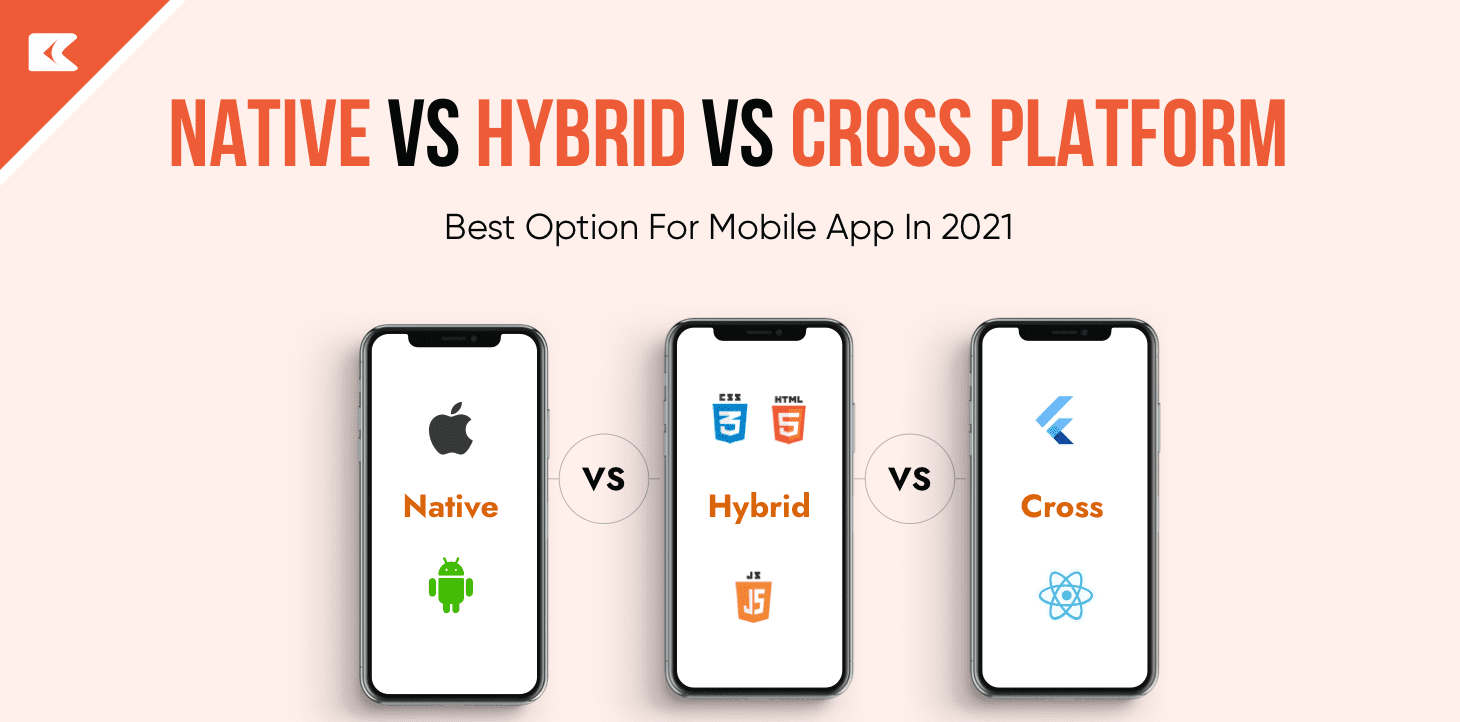Native vs Hybrid vs Cross Platform – Best option for Mobile App in 2024
- April 1, 2022
-
2364 Views
- by Ishan Vyas

Mobile app development is always a challenge for businesses primarily because they find it difficult to arrive at a development methodology. Building a mobile app requires a great deal of research and analysis of the type of business you wish to achieve with the mobile app.
Factors such as scale of operations, traffic and other consumer-facing parameters need to be taken into consideration before finalizing on a solution. But even before a solution is designed and developed, there is a key element that you need to finalize:
Should I build a native app or a hybrid mobile app or should I invest in a cross-platform app?
Answering this question is a bit tricky but before we go into the answer, let us have a brief look at what exactly these 3 modes of mobile app development are.
What is Native Mobile App Development?
It is the process of building an app exclusively for one of the main app platforms like Android and iOS. You have dedicated tools to build native apps for respective operating systems.
Some examples are Java and Kotlin for Android, and Swift and Objective C for iOS.
This form of development lays more emphasis on the app deriving underlying capabilities of the operating system for which it was developed. Developers can easily add more features in such apps because of its ability to directly leverage use of core smartphone hardware elements such as GPS, Proximity sensors, camera, microphone, etc.
What is Hybrid Mobile App Development?
Creating a hybrid mobile app means to build an integrated web and mobile solution wherein core solution resides in a web format within a native mobile app platform.
The core programs are created with web development languages like HTML, CSS, and JavaScript and these are embedded into native mobile apps with the help of plugins. The plugins act like a bridge for the web code to leverage the capabilities of the native app.
In simple terms, hybrid apps work within embedded browser like configurations within a native app. The Android OS utilizes WebView and iOS relies on WKWebView to display the hybrid app content within the native app environment.
What is Cross Platform App Development?
There is a strong confusion that exists in the business community where entrepreneurs often mistake cross-platform app development and hybrid app development to be the same. In reality, they are different.
Cross platform app development works on the principle of building reusable and shareable code that can be used to build apps for different OS platforms. It brings together a concept of writing a single piece of code that can be reused across platforms and reduces development effort and cost considerably.
Now let’s examine the million-dollar question:
Should a business build its mobile app with native, hybrid or cross platform development strategy?
It is hard to pick a winner, but we have made every effort to identify which strategy provides the best ROI on some important app development paradigms that every business would be interested in.
Based on the merits of each element, you can decide which development methodology should your mobile app development practice take up. Here are our observations of the key pillars of a mobile app and how each of the 3 development principles matches up to each other in these key pillars:
Cost of Development
If you are small business or startup, then cost will definitely be a top priority while making IT investment decisions.
This is where factors like less effort in development, faster time to market, re-usable code fragments will all play a key role. As we have already mentioned, above, Cross platform application development is the ideal winner in this category as it allows developers to build a single source code that can be transformed into respective OS based app.
Several cross-platform app development features enable developers to easily bring the native app experience in this mode of development. With lower effort, it could be developed with less resources and is an ideal option when you want to build an app to cater to target audiences on several platforms at the same time.
Performance
When your mobile app is intended to serve customers, performance is a key priority. And by performance we mean the ability of your mobile app to meet demanding scenarios across either OS platforms.
This is where native mobile application development can be the best option. Following a native development approach allows you to explore advanced features of smartphones easily such as memory management, network and wireless access points, etc. to optimize service delivery. This will greatly reflect on the performance of your mobile app across a broad range of devices running on both platforms.
Hybrid and Cross platform application development requires extra framework-based support to deliver more features at scale and still it may face restrictions or limitations in exploring the full power of smartphones as effectively as native mobile apps do.
Development Tools and Library Support
This section witnesses a close and tight competition between all 3 approaches. Today, there are several options available for developers to build apps in any of these development principles.
For native app development, you can rely on Xcode, AppCode and Android studio to deliver groundbreaking app solutions.
For hybrid app development, there are tools like Ionic, Apache Cordova and Visual Studiothat will help developers build apps faster.
When it comes to Cross Platform app development, you have tools like React Native, Flutter and Xamarin to help with seamless app development.
Native apps do not rely much on other open-source libraries to incorporate features and capabilities but both hybrid and cross platform app development require extensive support from libraries and frameworks to create an equivalent experience of native apps.
But still, when it comes to a technical development perspective, all 3 modes have sufficient capability to support themselves and hence a clear winner cannot be picked up in this regard.
User Experience and Customization
Today, customers demand not just a great performance from an app, but also a better user experience throughout their interaction. This is where usability, customization and personalization become a key driver in decision making.
Here native apps have an inherent advantage of better UI capabilities as it leverages the preset libraries and interface components of the underlying OS and is easily customizable. UI performance too is higher in native apps.
Cross platform apps do provide similar performance in UI but it falls short in avenues where their performance is dependent on other native apps within the smartphone, as their interoperability doesn’t have a good track record. So overall, native app development works out to be ahead in this sector.
Security
When your mobile app has direct impact on customer data i.e. if you manage personal information, then it is very essential to ensure that your app doesn’t have any security flaws or vulnerabilities.
Any compromise in customer data could result in damages that can render your business bankrupt.
As security is coupled to numerous in-built smartphone capabilities, native apps offer a better scope for building security features. As it can easily leverage core OS credentials, it is easier for developers to introduce measures such as encryption of files, intelligent fraud detection across core OS libraries and much more. Implementing Android device management software is one way to enhance the security of your app and protect sensitive customer data.
This is one of the key reasons why financial and government organizations across the world have more preference for native mobile app development as it offers a more secure environment for customer data that passes through the app in its daily service cycle.
We have covered 5 key pillars that every mobile app of today needs to have a reliable focus on. It can be observed here that native app development always has an extra edge over hybrid and cross platform versions, and it is rightly so. Native apps have more access and privileges to core OS capabilities and protocols, and they are bound to be more robust in terms of performance and user experience.
But for small businesses and startups, sometimes speed to market, cost and ease of development maybe of greater priority.
This is where hybrid and cross platform development makes a case. Brands like Airbnb started off with React Native, a cross platform app development technology in its initial days, because they wanted to bring updates faster and manage the codebase easier with less staff.
As time evolved, they shifted their focus to a high-performance app and hence the transition began for them from cross platform to native apps. This model of transition will be a common sight in the mobile app development space as market demands are highly dynamic and you will certainly have to evolve along with it.
Conclusion
We are not declaring a definitive winner in this competition as businesses now have the option to choose a priority from the elements we have covered.
Once that is fixed, you can choose the platform that best supports the key pillar. If you are a business owner wanting to develop a great mobile app for your customers and is on the lookout for a sustainable development model, get in touch with us.
Our consultants will work with you to identify the best-fit development methodology for your mobile apps to ensure that your business remains competitive and successful.





 SaaS Development
SaaS Development Web Application Development
Web Application Development Mobile Application Development
Mobile Application Development Custom Software Development
Custom Software Development Cloud Development
Cloud Development DevOps Development
DevOps Development MVP Development
MVP Development Digital Product Development
Digital Product Development Hire Chatbot Developers
Hire Chatbot Developers Hire Python Developers
Hire Python Developers Hire Django Developers
Hire Django Developers Hire ReactJS Developers
Hire ReactJS Developers Hire AngularJS Developers
Hire AngularJS Developers Hire VueJS Developers
Hire VueJS Developers Hire Full Stack Developers
Hire Full Stack Developers Hire Back End Developers
Hire Back End Developers Hire Front End Developers
Hire Front End Developers AI Healthcare Software Development & Consulting
AI Healthcare Software Development & Consulting Healthcare App Development
Healthcare App Development EHR Software Development
EHR Software Development Healthcare AI Chatbot Development
Healthcare AI Chatbot Development Telemedicine App Development Company
Telemedicine App Development Company Medical Billing Software Development
Medical Billing Software Development Fitness App Development
Fitness App Development RPM Software Development
RPM Software Development Medicine Delivery App Development
Medicine Delivery App Development Medical Device Software Development
Medical Device Software Development Patient Engagement Software Solutions
Patient Engagement Software Solutions Mental Health App Development
Mental Health App Development Healthcare IT Consulting
Healthcare IT Consulting Healthcare CRM Software Development
Healthcare CRM Software Development Healthcare IT Managed Services
Healthcare IT Managed Services Healthcare Software Testing services
Healthcare Software Testing services Medical Practice Management Software
Medical Practice Management Software Outsourcing Healthcare IT Services
Outsourcing Healthcare IT Services IoT Solutions for Healthcare
IoT Solutions for Healthcare Medical Image Analysis Software Development Services
Medical Image Analysis Software Development Services Lending Software Development Services
Lending Software Development Services Payment Gateway Software Development
Payment Gateway Software Development Accounting Software Development
Accounting Software Development AI-Driven Banking App Development
AI-Driven Banking App Development Insurance Software Development
Insurance Software Development Finance Software Development
Finance Software Development Loan Management Software Development
Loan Management Software Development Decentralized Finance Development Services
Decentralized Finance Development Services eWallet App Development
eWallet App Development Payment App Development
Payment App Development Money Transfer App Development
Money Transfer App Development Mortgage Software Development
Mortgage Software Development Insurance Fraud Detection Software Development
Insurance Fraud Detection Software Development Wealth Management Software Development
Wealth Management Software Development Cryptocurrency Exchange Platform Development
Cryptocurrency Exchange Platform Development Neobank App Development
Neobank App Development Stock Trading App Development
Stock Trading App Development AML software Development
AML software Development Web3 Wallet Development
Web3 Wallet Development Robo-Advisor App Development
Robo-Advisor App Development Supply Chain Management Software Development
Supply Chain Management Software Development Fleet Management Software Development
Fleet Management Software Development Warehouse Management Software Development
Warehouse Management Software Development LMS Development
LMS Development Education App Development
Education App Development Inventory Management Software Development
Inventory Management Software Development Property Management Software Development
Property Management Software Development Real Estate CRM Software Development
Real Estate CRM Software Development Real Estate Document Management Software
Real Estate Document Management Software Construction App Development
Construction App Development Construction ERP Software Development
Construction ERP Software Development






